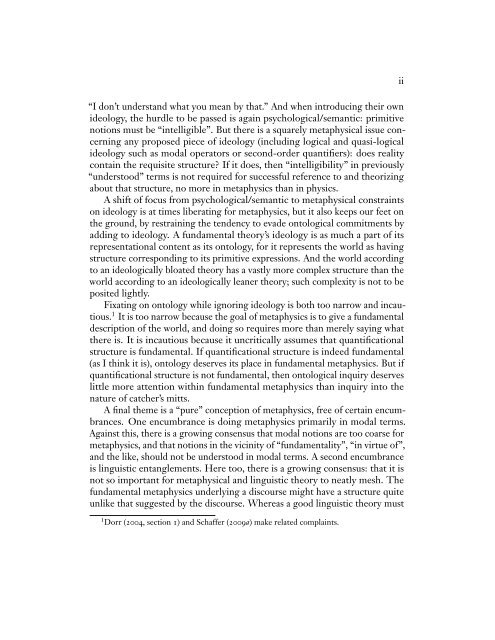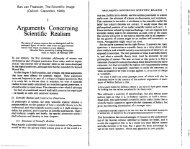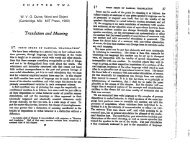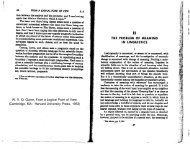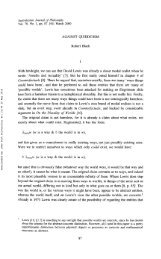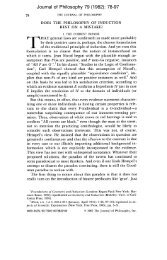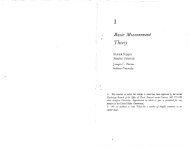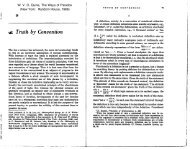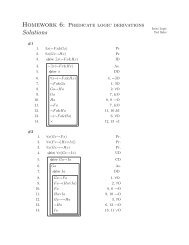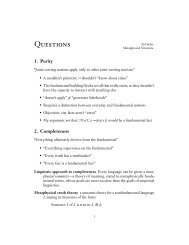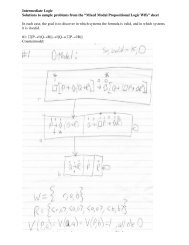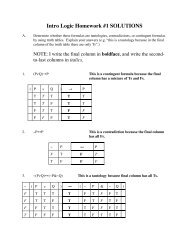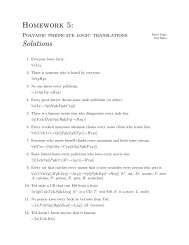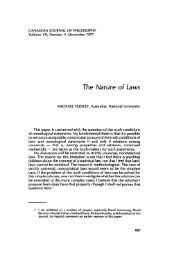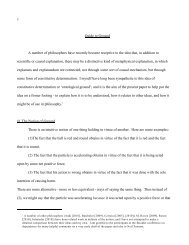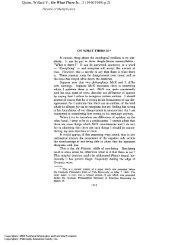Writing the Book of the World - Ted Sider
Writing the Book of the World - Ted Sider
Writing the Book of the World - Ted Sider
You also want an ePaper? Increase the reach of your titles
YUMPU automatically turns print PDFs into web optimized ePapers that Google loves.
“I don’t understand what you mean by that.” And when introducing <strong>the</strong>ir own<br />
ideology, <strong>the</strong> hurdle to be passed is again psychological/semantic: primitive<br />
notions must be “intelligible”. But <strong>the</strong>re is a squarely metaphysical issue concerning<br />
any proposed piece <strong>of</strong> ideology (including logical and quasi-logical<br />
ideology such as modal operators or second-order quantifiers): does reality<br />
contain <strong>the</strong> requisite structure? If it does, <strong>the</strong>n “intelligibility” in previously<br />
“understood” terms is not required for successful reference to and <strong>the</strong>orizing<br />
about that structure, no more in metaphysics than in physics.<br />
A shift <strong>of</strong> focus from psychological/semantic to metaphysical constraints<br />
on ideology is at times liberating for metaphysics, but it also keeps our feet on<br />
<strong>the</strong> ground, by restraining <strong>the</strong> tendency to evade ontological commitments by<br />
adding to ideology. A fundamental <strong>the</strong>ory’s ideology is as much a part <strong>of</strong> its<br />
representational content as its ontology, for it represents <strong>the</strong> world as having<br />
structure corresponding to its primitive expressions. And <strong>the</strong> world according<br />
to an ideologically bloated <strong>the</strong>ory has a vastly more complex structure than <strong>the</strong><br />
world according to an ideologically leaner <strong>the</strong>ory; such complexity is not to be<br />
posited lightly.<br />
Fixating on ontology while ignoring ideology is both too narrow and incautious.<br />
1 It is too narrow because <strong>the</strong> goal <strong>of</strong> metaphysics is to give a fundamental<br />
description <strong>of</strong> <strong>the</strong> world, and doing so requires more than merely saying what<br />
<strong>the</strong>re is. It is incautious because it uncritically assumes that quantificational<br />
structure is fundamental. If quantificational structure is indeed fundamental<br />
(as I think it is), ontology deserves its place in fundamental metaphysics. But if<br />
quantificational structure is not fundamental, <strong>the</strong>n ontological inquiry deserves<br />
little more attention within fundamental metaphysics than inquiry into <strong>the</strong><br />
nature <strong>of</strong> catcher’s mitts.<br />
A final <strong>the</strong>me is a “pure” conception <strong>of</strong> metaphysics, free <strong>of</strong> certain encumbrances.<br />
One encumbrance is doing metaphysics primarily in modal terms.<br />
Against this, <strong>the</strong>re is a growing consensus that modal notions are too coarse for<br />
metaphysics, and that notions in <strong>the</strong> vicinity <strong>of</strong> “fundamentality”, “in virtue <strong>of</strong>”,<br />
and <strong>the</strong> like, should not be understood in modal terms. A second encumbrance<br />
is linguistic entanglements. Here too, <strong>the</strong>re is a growing consensus: that it is<br />
not so important for metaphysical and linguistic <strong>the</strong>ory to neatly mesh. The<br />
fundamental metaphysics underlying a discourse might have a structure quite<br />
unlike that suggested by <strong>the</strong> discourse. Whereas a good linguistic <strong>the</strong>ory must<br />
1 Dorr (2004, section 1) and Schaffer (2009a) make related complaints.<br />
ii


